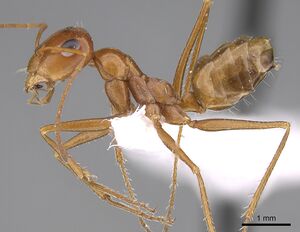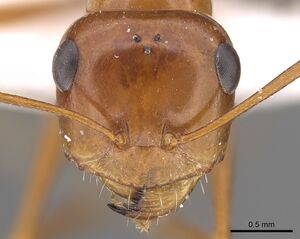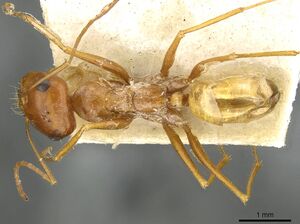Cataglyphis arenaria
| Cataglyphis arenaria | |
|---|---|

| |
| Scientific classification | |
| Kingdom: | Animalia |
| Phylum: | Arthropoda |
| Class: | Insecta |
| Order: | Hymenoptera |
| Family: | Formicidae |
| Subfamily: | Formicinae |
| Tribe: | Formicini |
| Genus: | Cataglyphis |
| Species group: | albicans |
| Species complex: | livida |
| Species: | C. arenaria |
| Binomial name | |
| Cataglyphis arenaria Finzi, 1940 | |
Identification
Collingwood and Agosti (1996) - SI 110-116. This species and Cataglyphis aurata, Cataglyphis cinnamomea, Cataglyphis livida, Cataglyphis rubra and Cataglyphis semitonsa, belong to the Cataglyphis albicans species complex. Cataglyphis arenarius have a yellowish body colour except for the gaster which is dark from the posterior edge of the first tergite. The petiole in profile is shorter and has a flatter dorsum than C. rubra.
Salata et al. (2021) - Whole body yellow, only gaster sometimes with indistinctly infuscated apex; mesosoma, posterior part of the head and coxae covered with a layer of silvery hair.
Cataglyphis arenaria was separated from Cataglyphis livida and Cataglyphis viaticoides based on the presence of a thick layer of silvery hair on mesosoma and posterior part of the head. Two years after the original description of C. arenaria, Karavaiev (1911) described Myrmecocystus albicans ssp. lividus var. aurata, which was later validated by Menozzi (1932) as trinominal. The latter species also was separated from C. livida based on presence of silvery hair on its body. Probably, Karavaiev was unaware of the existence of C. arenaria during his work on C. aurata. Study of type specimens and descriptions of both C. arenaria and C. aurata did not provide any characters useful in separating these two species. Thus, we conclude that both taxa could be conspecific (see also note in Cataglyphis argentata and Cataglyphis aurata. However, this hypothesis requires verification based on larger material collected from the whole area of their distribution, supported with studies on male genitalia, and genetic analyses.
Distribution
Latitudinal Distribution Pattern
Latitudinal Range: 34.85° to 26.433333°.
| North Temperate |
North Subtropical |
Tropical | South Subtropical |
South Temperate |
- Source: AntMaps
Distribution based on Regional Taxon Lists
Afrotropical Region: Saudi Arabia, United Arab Emirates.
Palaearctic Region: Algeria (type locality), Jordan, Oman.
Distribution based on AntMaps
Distribution based on AntWeb specimens
Check data from AntWeb
Countries Occupied
| Number of countries occupied by this species based on AntWiki Regional Taxon Lists. In general, fewer countries occupied indicates a narrower range, while more countries indicates a more widespread species. |

|
Estimated Abundance
| Relative abundance based on number of AntMaps records per species (this species within the purple bar). Fewer records (to the left) indicates a less abundant/encountered species while more records (to the right) indicates more abundant/encountered species. |

|
Biology
Castes
Images from AntWeb
   
| |
| Worker. Specimen code casent0906452. Photographer Cerise Chen, uploaded by California Academy of Sciences. | Owned by KSMA; KSU, King Saud University Museum of Arthropods. |
    
| |
| Worker. Specimen code casent0906455. Photographer Cerise Chen, uploaded by California Academy of Sciences. | Owned by KSMA; KSU, King Saud University Museum of Arthropods. |
   
| |
| Syntype of Cataglyphis arenaria. Worker. Specimen code casent0911101. Photographer Z. Lieberman, uploaded by California Academy of Sciences. | Owned by MHNG, Geneva, Switzerland. |
Nomenclature
The following information is derived from Barry Bolton's Online Catalogue of the Ants of the World.
- arenaria. Cataglyphis albicans var. arenaria Finzi, 1940: 164.
- [First available use of Myrmecocystus albicans subsp. lividus var. arenaria Forel, 1909e: 384 (w.) ALGERIA; unavailable (infrasubspecific) name (Agosti, 1990b: 1498).]
- Type-material: syntype workers (number not stated).
- Type-localities: Algeria: Biskra, 9-19.iii.1909 (A. Forel), Algeria: El Kantara, 9-19.iii.1909 (A. Forel).
- Type-depositories: MCZC, MHNG.
- Santschi, 1929b: 40 (q.); Cagniant, 2009: 52 (m.).
- As unavailable (infrasubspecific) name: Santschi, 1910f: 234; Forel, 1911f: 280; Forel, 1911h: 458; Karavaiev, 1912a: 16; Stitz, 1917: 348; Santschi, 1921d: 72; Emery, 1925b: 262; Santschi, 1929b: 40; Santschi, 1929c: 107; Santschi, 1932f: 518; Menozzi, 1934: 166; Santschi, 1934f: 176; Santschi, 1938a: 43; Weber, 1943c: 346 (in list); Bernard, 1953a: 201.
- Subspecies of albicans: Agosti, 1990b: 1498; Bolton, 1995b: 134.
- Status as species: Collingwood & Agosti, 1996: 378; Cagniant, 2009: 51; Collingwood, et al. 2011: 454; Borowiec, L. 2014: 51; Borowiec, L. & Salata, 2020: 5; Salata, Kiyani, et al. 2021: 126; Sharaf, Abdel-Dayem, et al. 2020: 540; Sharaf, Wetterer, et al. 2022: 19.
- Distribution: Algeria, Libya, Morocco, Oman, Tunisia, United Arab Emirates.
Description
References
- Borowiec, L. 2014. Catalogue of ants of Europe, the Mediterranean Basin and adjacent regions (Hymenoptera: Formicidae). Genus (Wroclaw) 25(1-2): 1-340.
- Collingwood, C. A. and D. Agosti. 1996. Formicidae (Insecta: Hymenoptera) of Saudi Arabia (part 2). Fauna Saudi Arabia. 15:300-385.
- Salata, S., Kiyani, H., Minaei, K., Borowiec, L. 2021. Taxonomic review of the Cataglyphis livida complex (Hymenoptera, Formicidae), with a description of a new species from Iran. ZooKeys 1010, 117–131 (doi:10.3897/zookeys.1010.58348).
- Sharaf, M. R., Wetterer, J. K., Mohamed, A. A., Aldawood, A. S. 2022. Faunal composition, diversity, and distribution of ants (Hymenoptera: Formicidae) of Dhofar Governorate, Oman, with updated list of the Omani species and remarks on zoogeography. European Journal of Taxonomy 838: 1-106 (doi:10.5852/ejt.2022.838.1925).
- Sharaf, M.R., Abdel-Dayem, M.S., Mohamed, A.A., Fisher, B.L., Aldawood, A.S. 2020. A preliminary synopsis of the ant fauna (Hymenoptera: Formicidae) of Qatar with remarks on the zoogeography. Annales Zoologici 70: 533-560 (doi:10.3161/00034541anz2020.70.4.005).
References based on Global Ant Biodiversity Informatics
- Agosti D. 1990. Review and reclassification of Cataglyphis (Hymenoptera, Formicidae). Journal of Natural History 24: 1457-1505.
- Bernard F. 1953. Les fourmis du Tassili des Ajjer. Pp. 121-250 in: Bernard, F. (ed.) 1953. Mission scientifique au Tassili des Ajjer (1949). Volume I. Recherches zoologiques et médicales. Paris: P. Lechevalier, 302 pp.
- Borowiec L. 2014. Catalogue of ants of Europe, the Mediterranean Basin and adjacent regions (Hymenoptera: Formicidae). Genus (Wroclaw) 25(1-2): 1-340.
- Cagniant H. 2009. Le genre Cataglyphis Foerster, 1850 au Maroc (Hyménoptères Formicidae). Orsis 24: 41-71.
- Collingwood C.A., D.Agosti, M.R. Sharaf, and A. van Harten. 2011. Order Hymenoptera, family Formicidae. Arthropod fauna of the UAE, 4: 405474
- Collingwood, C. A., and Donat Agosti. "Formicidae (Insecta: Hymenoptera) of Saudi Arabia (Part 2)." Fauna of Saudi Arabia 15 (1996): 300-385.
- Forel A. 1911. Sur le genre Metapone n. g. nouveau groupe des Formicides et sur quelques autres formes nouvelles. Rev. Suisse Zool. 19: 445-459.
- Karavaiev V. 1912. Ameisen aus Tunesien und Algerien, nebst einigen unterwegs in Italien gesammelten Arten. Rus. Entomol. Obozr. 12: 1-22.
- Santschi, F. 1929. Fourmis du Sahara central recoltees par la Mission du Hoggar (Fevrier-Mars 1928). Bulletin de la Société d'Histoire Naturelle de l'Afrique du Nord 20: 97-108.
- Santschi, F. 1934. Fourmis du Sahara central. Memoires de la Société d'Histoire Naturelle d'Afrique du Nord 4: 165-177.
- Santschi, F. 1938. Quelques nouvelles fourmis d'Egypte. Bulletin de la Société Entomologique d'Egypte 21: 28-44.
- Santschi, F.. "Étude sur les Cataglyphis." Revue Suisse de Zoologie 36 (1929): 25-70.
- Sharaf M. R., B. L. Fisher, H. M. Al Dhafer, A. Polaszek, and A. S. Aldawood. 2018. Additions to the ant fauna (Hymenoptera: Formicidae) of Oman: an updated list, new records and a description of two new species. Asian Myrmecology 10: e010004
- Stitz, H.. "Ameisen aus dem westlichen Mittelmeergebiet und von den Kanarischen Inseln." Mitteilungen aus den Zoologischen Museum in Berlin 8 (1917): 333-353.
- Weber N. A. 1943. The ants of the Imatong Mountains, Anglo-Egyptian Sudan. Bulletin of the Museum of Comparative Zoology 93: 263-389.

